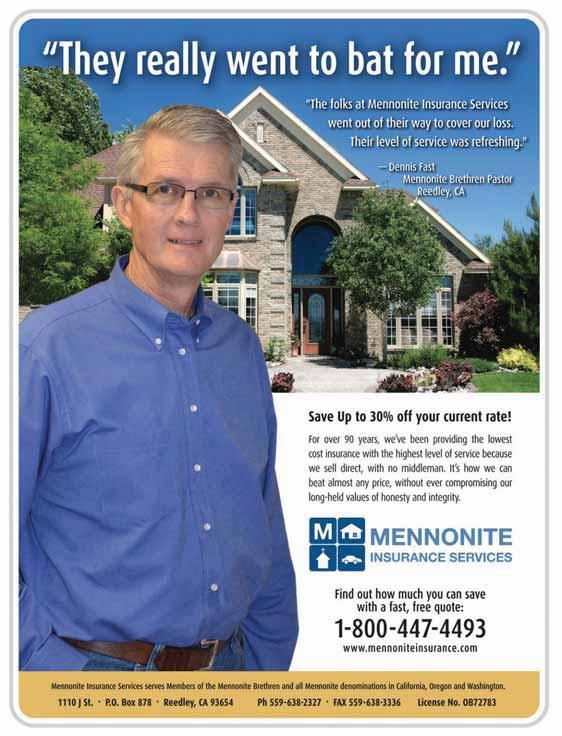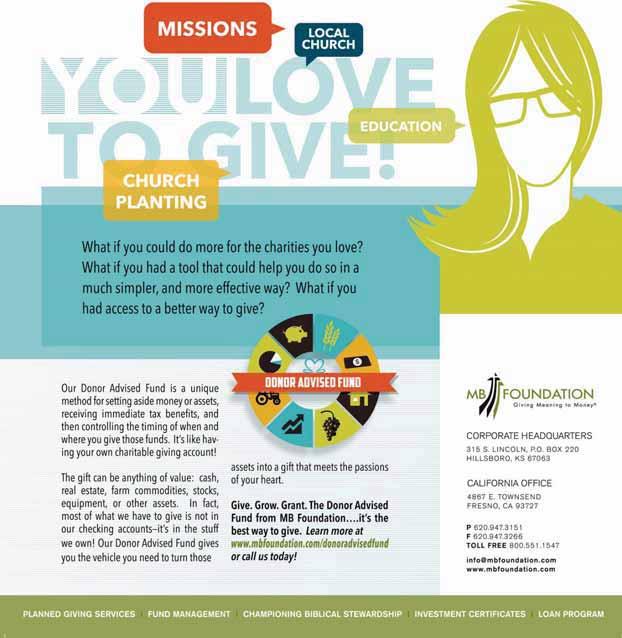

CHRISTIAN LEADER

15 Retirement works
18 Road to missions
27 Beauty and PowerPoints



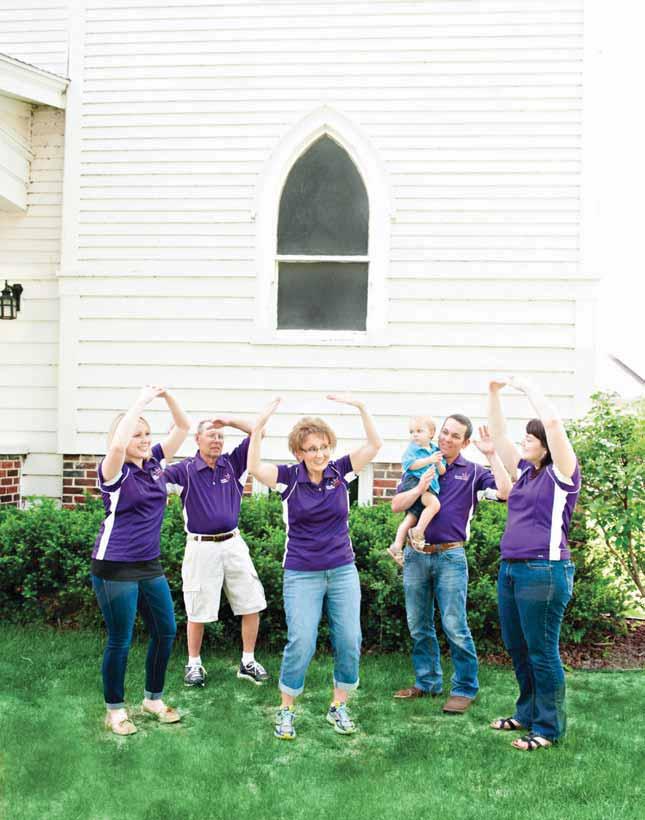


When U.S. Mennonite Brethren gather for the National Convention in the San Francisco Bay area later this month, we will vote on a recommendation to revise Article 13 of our Confession of Faith. The Board of Faith and Life (BFL) is asking that we affirm a new statement regarding “Love, Peacemaking and Reconciliation,” the title recommended for the article that is currently called “Love and Nonresistance.”
We are all aware that many times church conflicts are among the most painful, so this could test our ability to live out our Confession.

Connie Faber Editor
Since January 2013, BFL has provided numerous opportunities for input, feedback and counsel and has tested several drafts of Article 13 with us. Assuming we have spoken well and BFL has listened well, this recommendation should have the support it needs to pass. But as with many decisions, it’s unlikely that all of us will be 100 percent happy—and that means we will have the opportunity to practice our commitment to living at peace with one another, including those in our family of faith with whom we disagree. We are all aware that many times church conflicts are among the most painful, so this could test our ability to live out our Confession. The words in a document, even words chosen carefully and prayerfully, are meaningless if we don’t mirror them with our actions.
“No matter what words we use to state our commitment to living as disciples of Jesus Christ who pursue peace and reconciliation, what really matters is how we live our lives,” writes BFL in the board’s October 2013 open letter. “In Article 12 we have agreed that our kingdom citizenship takes priority over all other loyalties. In view of Article 12, we now need to find ways to implement the principles of Article 13. We understand that simply changing the wording to our Confession of Faith alone will yield minimal results in how we live.”
The letter goes on to say that the national BFL will be working with district BFLs to “strengthen our understanding of and commitment to conflict resolution …. We believe that these efforts will result in an outcome that allows us to have integrity in our pursuit of the biblical ideal of peacemaking and will give us the opportunity to grow in unity toward a vibrant peace witness in our homes, churches, communities and in the world.”
As we prepare for the USMB National Convention, we must take seriously the responsibility of thinking carefully about our theological statement on peacemaking. And more importantly, we must commit to being peacemakers every day by our actions and not just our words.
















Russ Claassen

Each year my family and I gather up the tent along with our other camping gear and enough fun campfire food for a summer kickoff camping trip. It is one of the few times during the year we are able to spend 48 hours of uninterrupted time together. No phone calls, emails, video games or television. It is just us, our gear and whatever we encounter along the way.
Time together has proven to be refreshing, renewing, calming, strengthening and healing. We are all in on this camping experience! So why is it that every year when the camping trip rolls around, we find it so hard to take the time off and to disconnect from everything else to make time to be together? Why is it that hard to focus on the relationships that are most dear? Our struggles to break out of our normal daily practices can seem insurmountable. Although we know what is most beneficial, it is easier to go on as usual. I find the same struggle in my life with Christ. I love the psalmist’s words in Psalm 84. He writes, “How lovely is your dwelling place, O Lord Almighty! My soul yearns, even faints, for the courts of the Lord; my heart and my flesh cry out for the living God.”
As I read this, I am filled with a desire to crave the Lord with such passion. The writer is all in with God. He is longing for the presence of the Lord. I am left with the sense that nothing will stand between him and his relationship with God. In fact, he seems to be engulfed in an attitude that says, “I just want to be with you!”
Even though our camping attitudes can be tested by an allnight downpour or a broken tent pole, our family is strengthened by these times together. It is often more rewarding for us to be together through the worst of circumstances than to walk alone during the easiest of times. That is even truer for me in my relationship with God. “Better is one day in your courts than a thousand elsewhere” (v. 10). I have found nothing more rewarding than time intentionally spent in the presence of God.
Are you all in with God? Do you long for the Lord’s living presence in your life? What keeps you from the relationship you most desire with the Lord? Is there a place you go or a posture you take that helps you focus on the presence of God? If you were to choose one thing to do this week that would help you draw near to God, what would it be? Will you commit to it?
Russ Claassen is the youth pastor at Koerner Heights Church, Newton, Kan., and is the Southern District Conference youth minister.

“My soul yearns, even faints, for the courts of the Lord; my heart and my flesh cry out for the living God.” Psalm 84:2
CHRISTIAN LEADER
July / August 2014
Volume 77 • Number 4
Connie Faber EDITOR
Myra Holmes ASSISTANT EDITOR
Shelley Plett GRAPHIC DESIGNER
Cats Cradle Photography COVER PHOTO
See story on page 17
The Christian Leader (ISSN 0009-5149) is a gathering place for the people, passions and mission of U.S Mennonite Brethren. The Christian Leader is published bimonthly by the U.S. Conference of Mennonite Brethren Churches. However, the opinions expressed here are not necessarily those of the church as a whole.
COPYRIGHT The articles printed in the Christian Leader are owned by the CL or by the author and may not be reprinted without permission. Unless noted, Scripture quotations are from the New International Version.
READER PARTICIPATION Letters to the editor should be 300 words or less and on one subject. Letters must be signed and include the writer’s city and state. Letters will be edited for clarity, appropriateness and length. Letters will be published, as space allows, unless marked, “Not for publication.” Readers interested in contributing essays for In My Humble Opinion and First Person should contact the editor. Freelance article submissions are welcome; a SASE must accompany articles.
SUBSCRIPTIONS $10 for six issues and $20 for 12 issues ($15, $30 in Canada; all other countries $25 for six issues); $1.50 per copy
CORRESPONDENCE: All correspondence, including subscription questions and address updates, should be addressed to Christian Leader Box 155, 107 N. Main, Hillsboro, KS 67063-0155 Phone: 620.947.5543
E-mail: christianleader@usmb.org
MEMBERSHIP The Christian Leader is a member of the Evangelical Press Association and Meetinghouse, an association of Mennonite and Brethren in Christ editors.
POSTMASTER Send address changes to Christian Leader, Box 155, Hillsboro, KS 67063. Periodicals postage paid at Hillsboro, Kansas.
The Christian Leader is published by

U.S. Conference of MB Churches

Ed Boschman USMB executive director ebed@usmb.org
The glory belongs to God
Back in the summer of 2007 Carol and I were looking for a biblical foundation on which to build the new opportunity for me to serve the USMB family as executive director. We landed on Psalm 115:1: “Not to us, O Lord, not to us but to your name be the glory, because of your love and faithfulness.”
There is not an iota of doubt that the human part of me likes glory. When you add to that the fact that most of me is human, it makes for a significant and relentless challenge. It’s not that I intentionally nurture my pride. In fact, I think a lot about aiming to be humble. It’s just that it won’t go away. Pride is pretty much impossible to kill. That God is not interested in sharing his glory with me is just as clear. Isaiah 42:8 spells it out: “I am the Lord; that is my name! I will not yield my glory to another ….”
Some years ago I was at a Christian music concert and noticed that the band was intent on redirecting heavenward all the adulation they were getting from their fans. They kept raising their hands and pointing their fingers upwards and saying it was “all for him.” It seemed good and right to me, but I also wondered whether that was really possible as they were getting thunderous ovations, whistles and cheers.
I know enough about humanity, myself and crowds to know that when the lights are on you and the mic is in your hand, finding humility and deferring to God is complicated. Deflecting and redirecting all the glory to God is not a natural thing to do, but for this I want to be on record: The part of me that is spiritually born again by the
new heart that God has given me longs to do exactly that. As a couple too, it has been Carol and my hearts’ desire to serve faithfully and well and to give the glory to God. For those times we have not done so, we claim God’s grace and ask for yours.
For these past seven years, I have repeatedly invited our U.S. Conference of MB Churches to “partner as one family, serving one Lord, on one mission, for the transformation of individuals, families and communities.” Our mission statement emphasizes that we are a divinely constituted spiritual family and that Jesus would want us to behave as such. The core of the statement declares and affirms that we would have no God other than Jesus Christ, and that he is the center of our faith. Putting that lordship into action means that we partner with God on his mission to save the world.
While I am certain that the Spirit has not given every Christian the specific spiritual gift of evangelism, I am equally convinced that every believer has been called to live on mission. When we will love our neighbors as ourselves and then choose to begin a faith-follow relationship with Jesus, the Spirit will transform individuals and families and communities.
For whatever ways this season of service to Jesus and his USMB church has strengthened us as a family, reaffirmed our unequivocal commitment to Jesus and multiplied evangelism initiatives in our nation, Carol and I are grateful. Because of his love and faithfulness, all the glory belongs to God.
It has been Carol and my hearts’ desire to serve faithfully and well and to give the glory to God. For those times we have not done so, we claim God’s grace and ask for yours.
Sybil Kolbert

Am I serving people or God?
In the early morning, when the sun has not come up and my house is quiet, I spend time with God.
Time reading his Word and the words of authors who have poured out themselves to be his instrument.
Recently, I read this in Ann Voskamp’s book, One Thousand Gifts: “When service is unto people, the bones can grow weary, the frustration deep.”
Oh, how frustrating it is to serve people who don’t appreciate what you do. Who don’t say thank you. Who don’t appear to see what you do. I’ve heard it many times in the church and in my own family: “I stopped inviting people over to my house because I got tired of never being invited. No one appreciates what I do, so why do it at all.”
But we are not really serving people, are we? We are serving God.
“So whether you eat or drink or whatever you do, do it all for the glory of God” (1 Cor. 10:31). This concept of serving God and not man struck me one morning during my quiet time. Maybe this is where some of my frustration with blogging, church ministry or using my gift of encouragement has come from. This thought that I am serving others. Sure, others may benefit from what I do. But in reality, it is not for them. It is for God and his glory.
I don’t want to have to worry about who is reading my blog or how many people respond to my texts or when someone will invite me over for dinner. I don’t want to focus on the people. I want to focus on Jesus and how my work can glorify him.
Mother Teresa said, “The work we do is only our love for Jesus in action. If we pray the work…if we do

it to Jesus … if we do it for Jesus … if we do it with Jesus … that’s what makes us content.”
But there is that struggle. That pull toward my humanness that wants something in return. That wants to be encouraged, invited in and to know that I have made that heart connection. How can I know that I am reaching people for Jesus—that my words and actions are encouraging others—if they don’t tell me or do things for me?
God has repeatedly said to me, “Be still and know. You are doing my work.”
If I am doing the work that God has called me to, then I can know. He is making a way for me into the hearts of others.
Jesus says, “You know the saying, ‘One plants and another harvests.’ And it’s true. I sent you to harvest where you didn’t plant; others had already done the work, and now you will get to gather the harvest’”
(John 4:37-38, NLT.)
The analogy of the harvest is used many times in the Bible. In this passage, John suggests that there are times when we are the planters of the seed and not the harvesters. That is OK. I don’t have to know what my seed has produced—just that God will use it, in his way, in his time.
It is God that we serve. And he has already given us the greatest gifts. Love. Mercy. Grace. Jesus. It is because of these that I can serve, knowing that his approval is enough.
Sybil Kolbert is a school psychologist and uses her blog, “Peace it all Together,” to reflect on life, faith and issues related to having a child with sensory needs. Visit her at http://peaceitalltogether.blogspot.com.
ICOMB receives Lithuanian conference as member
A 30-hour detention didn’t keep international partners from attending the annual summit of the International Community of Mennonite Brethren (ICOMB) in Luanda, Angola, May 22–24. ICOMB is a global fellowship of Mennonite Brethren conferences. Representatives from Meserete Kristos Church (Mennonite) in Ethiopia held out against pressure to pay a bribe at customs and eventually arrived at the meeting. Unable to acquire visas, members from neighboring DR Congo were absent.
The Free Christian Church in Lithuania was officially accepted as an ICOMB member, bringing the total number of member conferences to 20.
Participants from Africa, Asia, Europe and the Americas gave reports from their conferences, shared experiences of fostering engagement with the Confession of Faith, selected recipients for the Global Scholarship Fund and continued to discern the role and authority of ICOMB.
Delegates green-lighted plans to hold a consultation on mission and prayer in the next two or three years. “We want to learn from one another and especially from God,” says ICOMB chair Rudi Plett of Paraguay. A new component to this year’s gathering was a multiday training session (May 16–17, 19–21) for local church leaders facilitated by global Mennonite Brethren. ICOMB representatives also participated in a Sunday gala (pictured).—Karla Braun
Pacific District
Hispanic churches convene
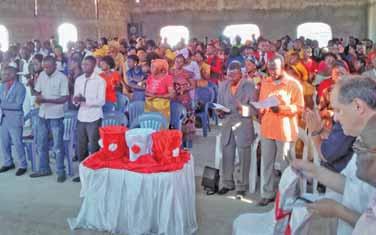
You don’t have to be big to have an impact, conference speaker Cesar Garcia told the Pacific District Hispanic Convention at their annual gathering May 30-31. Garcia, the general secretary of Mennonite World Conference (MWC), from Bogota, Colombia, was the speaker as about 300 adults, youth and children gathered at Fresno Pacific University. Fresno, Calif., for fellowship, inspiration and teaching under the theme Impacto 2014 (Impact 2014).
Twenty-five of the Pacific District’s 30 Spanish-speaking congregations were represented, coming to Central California from as far north as Portland, Ore., and from throughout California.
Garcia spoke from Jesus’ parable of the mustard seed, which illustrates how something very small can have a huge impact. He challenged the participants to make sure their seed “touches the ground,” by understanding their own communities and looking for unique ways the gospel meets the needs in their own context. He also emphasized that the bush that grows from a mustard seed exists for the purpose of providing shelter for the birds. In the same way, he said, the church exists not for itself but to give refuge to the people in the community.
The Hispanic churches organized as a ministry within the Pacific District Conference in 1987 and have been meeting for conventions annually since 1991. —Kathy Heinrichs Wiest
USMB launches new website
USMB launched a redesigned website June 3: www.usmb.org. Lori Taylor, USMB webmaster, says goals for the new site included a more contemporary design and easier access to information, including resources to connect the USMB family and equip them to pursue mission together. Taylor and USMB staff worked with IES, Inc., a website redevelopment company in Bakersfield, Calif.— USMB
Conection 2014 includes kids, youth
Kids attending Conection 2014 will participate in age-appropriate activities. Children through age 12 will enjoy story, play, rest and activity times during all sessions of both the National Pastors Conference and the National Convention. All care will be on-site at the hotel.
Brad and Delilah Isaak of Selma MB Church, Sanger, Calif., will be leading the youth track. “We anticipate a wonderful time of building friendships and memories together,” says Brad Isaak. Teens will have fun through group activities, such as spending a day at Great America Theme Park and playing games, and will learn through Bible study and a service project. Children and youth will eat meals with their parents. Most will join the Saturday evening session to enjoy comedian and illusionist Pete McLeod. Conection 2014 will be held July 24-26 in Santa Clara, Calif. For more information, visit www.usmb.org/menus/conection2014.html.—USMB
byTheNumbers


5 minutes with...
GEORGE AKINA
George Akina of North Fresno (Calif.) Church didn’t let stage IV prostate cancer prevent him from auditioning for Fresno’s Good Company Players’ recent production of The King and I. The 63-year-old veteran of dozens of community theater productions played the King of Siam to critical acclaim in 26 performances this past spring.


When did you learn you had cancer?
On March 15, 2013, while rehearsing Fiddler on the Roof. Fortunately, I was playing the elderly rabbi. It is a very aggressive cancer and has since spread throughout my en re skeleton.
Is there a Scripture that has helped you face the diagnosis?
Philippians 4:67 is the verse I have shared the most over the decades. It was wonderful to have “the peace that passes all understanding” become my own, personal reality.
Why did you audition for The King and I knowing that your health was so uncertain?
This was my dream role, and I knew that if God was in it, I would get the role even though the director and staff knew fully of my situa on.
How have you dealt with this demanding role?
It’s really been a journey about the “King of Kings” and I. I would go to the theater regardless of pain, fa gue and medica on sideeffects, knowing that even though I might not be up to it, he always was.
Was the deathbed scene at the end difficult to do?
● 4,703 lbs. – weight of largest cheesecake ever made, Jan. 25, 2009 by Philadelphia Kraft Foods Mexico
● Served to athletes in the first Olympic games in 776 B.C. to give them energy
● Arnold Reuben, known for his signature sandwiches, created New York Style cheesecake
Source: mobile-cuisine.com July 30 is NATIONAL
No, I was ac ng, but it was o en difficult for my wife and children to be reminded of my mortality. Fortunately, the curtain call closely followed as a reminder of my immortality.

Why do you enjoy theater?
God has given me gi s which I can express on stage. It’s when I’m on stage using those gi s that I feel the most fulfilled, most alive and most in his will.
For more about Akina read the The King and I review by Fresno Bee art critic Donald Munro at ttp://fresnobeehive.com/archives/31713 and Munro’s profile of Akina at http://www.fresnobee.com/2014/05/03/3905342/for-this-king-a-rolethat-challenges.html?sp=/99/1355/209/222/.
Interview by Kathy Heinrichs Wiest
Cheyenne Derksen

CL wins award
Foundation reports growth
MB Foundation, the U.S. Mennonite Brethren stewardship ministry, reports that for 2013 total assets grew by 10 percent and $15 million new gifts were received. Total assets were just over $153,400,000; 10 years ago, total assets were $47,319,000, representing growth of over 220 percent during the past decade. “This represents a faithful God, faithful donors, a faithful church family and a faithful staff,” says MBF President Jon C. Wiebe. To view the complete 2013 annual report, visit mbfoundation.com/financial-profile. —MBF

Christian Leader received one award in the 2014 Evangelical Press Association (EPA) annual contest. Matt Ford’s article, “Film shatters stereotypes of suburban poverty,” published in the February/March 2013 issue, was awarded fifth place in the “Cause of the Year: Apathy” category of the Higher Goals Awards. The EPA judge said, “This raises the issue and gives hope that the problem can and should be addressed in readers’ communities.” EPA is a professional association of some 300 Christian print and online publications.—CL


MCC seeks assistance
Mennonite Central Committee (MCC) is requesting donations to support the people of South Sudan, who are suffering trauma and extreme hunger as they flee an armed conflict in their newly-formed nation. More than 800,000 people are displaced within the country and more than 250,000 are refugees in neighboring countries, according to the United Nations. Nearly a third of the population is facing starvation. MCC is asking for financial donations, blankets and relief and hygiene kits. Donations can be made at donate.mcc.org. MCC is an inter-Mennonite agency that works for relief, development and peace in the name of Christ. —MCC

cookbook re-released
Extending the Table cookbook, the second in the World Community Cookbook series commissioned by Mennonite Central Committee and published by Herald Press, is being re-released with new recipes and more color photos than in the original edition. The new edition includes regional menus, gluten-free and vegetarian tags on recipes, new dishes (including some from countries not represented before) and numerous photos of prepared dishes to help those who are unfamiliar with the food. More than 120 cookbook users helped choose which recipes made the cut for the revised cookbook. For more information, visit www.mennomedia.org. —MennoMedia

FPU OFFERS NEW DEGREE
Summit tackles UNEMPLOYMENT

Brad Smith, pastor, businessman and nonprofit leader was the speaker for “The Work of Our Hands: Transformation Through Social Business,” held May 29 at Fresno Pacific University, Fresno, Calif. His role at this second annual summit was to equip leaders from faith-centered institutions to place the talents of the church in the service of social enterprise to address unemployment in California’s Central Valley. “The Work of Our Hands” was sponsored by the Center for Community Transformation, part of Fresno Pacific Biblical Seminary, the denominational seminary and a school of FPU. —FPU
Fresno Pacific University (FPU) will offer a new bachelor of arts degree in health care administration (BAHCA) at the university’s North Fresno Regional Center in the fall of 2014. Instruction will cover planning, business and financial management, public relations, human resources management, systems operation, policy making and law, all as they apply to heath care. FPU is the Mennonite Brethren school headquartered in Fresno, Calif. For more information, call 559-573-7800 or visit fresno.edu/northfresno.
By Trent Voth

When Jesus cleanses the temple he uses a whip and overturns tables. How do his actions guide my response to injustice?
recently saw a poster depicting the temple cleansing from John 2:13-22 that pictured Jesus with a whip in hand, bearing down on someone whose hand was raised, begging for mercy. The caption read, “If anyone ever asks you, ‘What would Jesus do?’ remind them that flipping over tables and whipping people are options.” It’s awkward to see Jesus portrayed this way. Yet the poster raises an important question, especially for our USMB family as we discuss what Jesus’ life and teachings entail for our stance on peace and nonviolence. Does Jesus’ example include a whip?
As Christians, we are disciples of Jesus’ teaching and example. Even when Jesus calls us to difficult actions like forgiving those who have wronged us (Matt. 18:2122) or loving and doing good to our enemies (Luke 6:27-36), we are called to faithful obedience. Our interpretive differences are not based on whether Jesus calls us to love our enemies—he clearly does—but rather on what “love” looks like. That’s why this example of Jesus takes such precedence in regard to peace and nonviolence.
This story is one of the few that appear in all four Gospel accounts (Matt. 21:12-17, Mark 11:15-19, Luke 19:45-48 and John 2:13-22). Although it is fascinating to compare and contrast each evangelist’s version, this article will focus on John’s. Of all four Gospel accounts, John 2:13-22 is by far the most descriptive and the only one that gives any hint of the manner in which Jesus acted.
One pivotal word
Our interpretation of this passage largely rests on one pivotal word. While it’s not uncommon for our interpretation of Scripture to rest upon individual words, it is rare for a single word to swing our view of Jesus as profoundly as it does in John 2. The term we must understand in this passage is the word “both” in verse 15.
Let’s set the stage. It’s Passover, one of the most important Jewish holidays that brings thousands of pilgrims to Jerusalem, and Jesus is one of them. These pilgrims come from far and wide, many desiring the once-in-a-lifetime experience of performing a sacrifice at the temple.
By this point in history, the temple sacrificial system is highly regulated. The only acceptable sacrifice is an animal that has been certified by the priests as pure and without blemish. Pilgrims can risk bringing their best animal from home, but what if on the way it is injured, becomes sick or even is scratched. Is it worth the risk of making the long trip just to be turned away from God’s forgiveness at the temple door? Of course not, especially when the temple has its own stock of preapproved animals available for purchase. Never mind that those selling the sacrificial animals also determine whether the animals brought from home are pure
enough. Is it any surprise they never are?
By Jesus’ day, it’s unlikely anyone brings an animal from home. The temple monopolizes the sacrificial animals. As with any monopoly, prices increase. To make matters worse, the temple has its own currency. So purchasing a sacrificial animal involves exchanging one’s coins into temple currency. Of course, there is an exchange rate and perhaps a little fee. You begin to see that even with all the sacrificial lambs around, it is the pilgrims who are fleeced by the temple system. But the people pay it—so would we! After all, how much is God’s forgiveness worth?
And or both
As Jesus enters the temple, John tells us that Jesus “found people selling cattle, sheep and doves, and others sitting at tables exchanging money.” Business as usual—the lucrative business of forgiveness profiteering. So, as John says, “(Jesus) made a whip out of cords, and drove all from the temple courts.” And here is where that massively important word occurs, “both sheep and cattle.”
This word “both” comes from the Greek word “te” which occurs frequently throughout the New Testament. It’s typically translated as “both,” “and” or “both and.” That’s why it’s such a problematic word. Notice the difference between its two possible translations: 1) “ … (he) drove all from the temple, and sheep and cattle” or 2) “ … (he) drove all from the temple, both sheep and cattle.”
In the first instance, John would be telling us that Jesus, with whip in hand, chases everyone and everything out of the temple, including the sheep and cattle. In this case there shouldn’t be anyone left in the temple at all, not even the livestock.
This raises some tricky interpretive issues because in the very next verse Jesus turns to those selling doves and orders them out as well. In order to interpret this text to mean that Jesus uses a whip to drive the people and livestock out of the temple, we’re forced to conclude that “all of them” doesn’t truly refer to everyone, since there are clearly people left in the temple after whatever “all of them” refers to has been driven out.
The second option paints a vastly different picture. In this instance, John would be telling us that Jesus uses the whip to drive out only the sheep and the cattle. In this case, “all of them” would be solely focused on the livestock destined for sacrifice. This translation would also fit the context of the story, not only because people remain in the temple but also because the next verse seems to continue the theme of releasing the sacrificial animals.
Contextually, literarily and even linguistically, John seems to be going out of his way to show that Jesus intends to free sacrificial animals and not to whip people. If people leave the temple while Jesus employs the whip, it is to chase down and recapture their sacrificial animals.
The final sacrifice
But now with Jesus’ arrival, sacrificial animals are unnecessary. There’s only one more sacrifice required and with Jesus standing in the temple, there’s no reason for the other sacrifices to be there. The impact of Jesus’ atonement and emancipation is prophetically and symbolically experienced by his actions in the temple.
This raises another important historical note. There is a reason that Jesus’ temple actions don’t lead to his immediate arrest. The temple is the center of Jewish life and identity. It is the locus of Jewish rebellion and revolt against foreign occupations. The Roman authorities know this so well that they built an intimidating garrison at the edge of the temple mount stocked with a legion of soldiers to quickly respond in the event of a violent outburst in the temple. However we interpret Jesus’ actions, the Roman authorities—whose very lives depend on responding quickly to violent demonstrations in the temple—don’t interpret Jesus’ actions as violence.
Apparently neither do the Jewish authorities, who don’t instantly send the temple police to arrest Jesus. Instead, they interpret Jesus’ action as a symbolic prophetic action by asking, “What sign can you show us for doing this?” This is not a question of whether Jesus’ actions are violent and damage property. This is an issue of Jesus’ authority to disrupt the temple system.
Jesus interrupts the temple sacrificial system for just a few minutes, and the world doesn’t end. Jesus is teaching the crowd a valuable lesson, but it is a dangerous lesson to teach under the watchful eye of the religious authorities. Life can go on without the temple working properly; indeed the temple hasn’t worked properly for years.
An historic heart transplant
For first-century Jews, the temple is the heart of cosmic reality, the nexus of heaven and earth. If the temple stops functioning, stops pumping out God’s life to the cosmos, the universe will die. This is a story of Jesus detaching the cosmos from the broken temple system, taking the universe off bypass and giving all of history a “heart transplant.”
While John 2 might not definitively prove Jesus is a pacifist, it also doesn’t provide an example of Jesus employing violence. Even if it did, there’s an awfully big leap from the violence of a whip to the violence of a sword, gun, drone or cruise missile. But what about overturning tables? If John 2 demonstrates Jesus’ authority to disrupt the temple system, can’t we be following Jesus’ example when we topple some tables? Well, yes and no.
Again, it depends on how we translate one word. This time the word is “overturned,” the combo word “anatrepo” in Greek.
“Ana-trepo” literally means “overturn.” In this sense the typical English translation is very direct. However, this word is only used two other times in Scripture, and in these places our English translations don’t tend to translate it as “overturn.” In fact, “anatrepo” is frequently translated as “upset.”
2 Tim. 2:18 reads: “They are upsetting the faith of some” (NRSV). Titus 1:11 says: “They must be silenced, since they are upsetting whole families …” (NRSV). While a potential translation in John 2:15 could be that Jesus “upset their tables,” that just doesn’t quite seem to fit the context.
However, there is a third translation that is beautifully appropriate for all the situations. “Anatrepo” can also be translated as “subvert” or “corrupt.” Such a translation is not only a better fit for 2 Tim. 2:18 and Titus 1:11, it is by far the best translation of John 2:15.
In the fleecing of pilgrims and the rampant abuse of both the people and the temple system, Jesus sees “corruption.” Moneychangers and sacrificial animal sellers have “subverted” the temple. So Jesus, in an absolutely beautifully holy and symbolic move, liberates the sacrificial animals and then precedes to “anatrepo” the tables of the moneychangers.
Jesus “subverts/corrupts” the tables of the moneychangers and in the processes “cleanses” the temple of corruption and subversion. Jesus identifies the corrupting influences and the purifying influences in God’s house. Ironically, the religious authorities believe Jesus, the purifier, has corrupted their system. He truly has.
There are times when, in our attempt to look like Jesus, we search for places where Jesus looks and acts like we do. Who, in his anger, acts violently, whips people and damages property. We must be especially careful to not project this kind of Jesus into the Bible in an effort to defend why we could also employ violence and property damage in our own moments of “righteous” anger.
When we interpret Jesus to look like us, we end up anatrepoing the true Jesus. We overturn, subvert and corrupt what the Gospel writers spend most of their time communicating—the example of Jesus in his confrontation of injustice. As we convert to be Christ-like, we have to be careful that we don’t convert Jesus to be like us.
Trent Voth is the assistant pastor of youth and worship at College Community Church MB in Clovis, Calif.

By Doug Heidebrecht


A Mennonite Brethren vision of the family of God
No two U.S. Mennonite Brethren congregations look the same. A church plant in Denver will look very different from a long-standing community church in Nebraska or a multiethnic congregation in Fresno. Our understanding of what it means to be the church is shaped by the diverse ministry concerns, missional challenges, leadership styles and worship practices that emerge from within the unique contexts in which we gather. In the midst of such diversity, we may wonder whether there is a common core that underlies a Mennonite Brethren understanding of the church.
Though Mennonite Brethren appeal to the New Testament as the model and authoritative guide regarding how to be the church today, we also look to our confessions of faith as a summary of our shared understanding of what the Bible teaches. Four themes emerge in our confessions’ description of what it means to be the family of God: new creation, community, ministers and witnesses.
New creation
Mennonite Brethren affirm God’s new creation, the church (2 Cor. 5:17; Gal. 6:15), as a single global body with Christ as the head (Col. 1:18; Eph. 4:15).
All Christians, whether they worship in Telugu in Hyderabad, in French in Kinshasa or in English in Hillsboro, follow Jesus as the head of the church. The outpouring of God’s Spirit at Pentecost established the church (Acts 1:4–5; 2:17–18) and his continuing presence now defines the church as the people of God (Rom. 8:9; 1 Cor. 12:3) in line with the continuing story of God’s relationship with Israel (1 Peter 2:9–10; Rom. 9:25–26). At conversion, each believer is cleansed by the Spirit (Titus 3:5) and incorporated into the body of Christ (1 Cor. 12:13).
The Spirit unites all believers into one body (Eph. 4:4) without distinction between male and female, nation, race or caste (Gal. 3:28; 1 Cor. 12:13; Col. 3:11; Rom. 10:12). The church embraces the diversity of humanity, and it does not make distinctions based on these differences (Gal. 5:6; 6:15).
The dated language of “Brethren” in our name highlights the significance of seeing the church as a family, where believers relate to each other as brothers and sisters. All believers are called to keep the unity of the
Spirit (Eph. 4:3), despite their differences, which reflects their common fellowship and mission.
Since “the church is God’s new creation,” it is called to “model God’s design for humanity” (Eph. 2:15; Col. 3:10–11). “The church belongs to the in-breaking kingdom of God” and as citizens of the kingdom, the church collectively witnesses to God’s reign in the world and models an alternative and separated community.
The primary allegiance of the church is to Christ as Lord and to his kingdom, over against all authorities embodied by the state or society (Acts 4:19–20). The church is called to resist the temptation to give the state the devotion owed to God and to reject the pressure to live by values that threaten or compromise the integrity of God’s reign. Nevertheless, Christians must obey all laws that do not conflict with God’s Word, and respect and pray for those in authority (Rom. 13:1; 1 Tim. 2:1–2).
The church gathers together regularly to worship and glorify the triune God, in celebration and thankfulness for his faithfulness, grace and salvation. Worship, as a response to God’s love, offers a transforming encounter with God through the presence of his Spirit, hearing his Word, participating together in singing and acknowledging dependence upon God through prayer (Acts 2:42; 1 Cor. 11,14; Eph. 5:19; Col. 3:16).
The practices of baptism and the Lord’s Supper, as acts of worship, proclaim the good news of salvation. Worship reorients, nurtures, renews and unites the church as the new people of God who follow Christ as head.
Community
When people receive God’s gift of salvation they are baptized upon their confession of Jesus as Lord and Savior (Matt. 28:19). Baptism by water immersion is a public sign of both the experience of the Spirit’s cleansing from sin and being raised to newness of life as well as believers’ entrance into the one body of Christ as expressed in the local church (Rom. 6:3; Gal. 3:27; 1 Cor. 10:2; 12:13).
While the church as the body of Christ represents the worldwide community of faith, it lives as visible local congregations. Church membership is a concrete sign of believers’ shared commitment to follow the Lord Jesus, their identification with the body of Christ and
their willingness to participate in the community of disciples (Acts 2:41–42; Mark 8:34; Eph. 4:20–21; Heb. 5:8–9).
The local church is a covenant community where members are committed to worship and fellowship together (Eph. 5:19–21). It is where members grow in maturity, demonstrate the fruit of the Spirit, use their spiritual gifts and encourage each other in faithful discipleship and witness (Gal. 5:22–23; 1 Cor. 12:4–30). Jesus’ command to make disciples, baptizing and teaching them to obey him, is grounded within the context of the church (Matt. 28:19–20).
As believers pray for one other, share each other’s joys and burdens and seek to build one another up, their love and care express mutual accountability (1 Cor. 14:3; Eph. 6:18; Col. 4:12–17). Attempts to reconcile sinning members reflect believers’ mutual responsibility for each other and are motivated by love and compassion (Matt. 18:15–18). In its observance of the Lord’s Supper, the church “expresses reconciliation, fellowship, peace and unity of all believers with Christ” (1 Cor. 11:23–26).
Similarly, local congregations are interdependent, working together in a spirit of love and mutual submission by following the model of New Testament church, which gathered as a hermeneutical community to seek consensus regarding ethical discernment, questions of biblical interpretation, and shared witness and mission (Matt. 18:18–20; Acts 15; 1 Cor. 14:29).
Ministers
The Spirit of God gifts each member for the purpose of building up the body of Christ and serving or ministering in the world (1 Cor. 12:7, 11). The work of the Spirit is expressed through the priesthood of all believers where everyone participates in ministry and relates together as a fellowship of equals (Act 2:17–18; Gal. 3:28; 1 Peter 2:5). This affirmation also underlies the Mennonite Brethren concept of “brotherhood,” with the implication that there is no inherent distinction between clergy and laity.
The church discerns the call of God and affirms those he gifts to equip the church for ministry (Eph. 4:11–13).
Mennonite Brethren affirm that a biblical understanding of leadership emerges from what it means to be the church, since the source of authority is the presence of Jesus within the church (Matt. 18:19–20).
Leadership is not defined as authority but as servanthood, because the ministry of leadership reflects one’s gifting or function in the church, not an office (Rom. 12:4–8). A typical Mennonite Brethren model of church governance is structured around a group of gifted leaders who are responsible for oversight and yet also recognize the authority of the Spirit in the gathered community.
Witnesses
The Spirit of God empowers the church “to witness to God’s salvation” and participate in God’s mission—“reconciling humans with God, each other and the world”
(Acts 1:8; 2 Cor. 5:18). Proclamation of the gospel involves both telling the good news and doing acts of love and compassion (Luke 4:18-19). Christ has commissioned the church to make disciples of all nations by calling people to repent and baptizing and teaching them to obey Jesus (Matt. 28:18–20).
The church, as Christ’s ambassador and agent of reconciliation, actively seeks to “defend the weak, care for the poor, and promote justice, righteousness and truth” within society (2 Cor. 5:20). The church is called to be a peacemaker in all situations (Matt. 5:9; Eph. 2:14–18), and by its life, the church bears witness to God’s reign by revealing “God’s saving purposes to the world.”
The identity of God’s wonderfully diverse family (John 17:20–21) centers around the Lord Jesus Christ, who spoke with great hope when he said, “I will build my church” (Matt. 16:18).
The Spirit unites all believers into one body (Eph. 4:4) without distinction...

So how is this vision of what it means to be the church lived out within your local congregation as you gather together as brothers and sisters, a community of disciples, as ministers and witnesses? What does it look like to be a new creation within the unique context in which you live?
Doug Heidebrecht is currently working in an international setting. Previously, he served as director of the Center for Mennonite Brethren Studies in Winnipeg, Man., and as an instructor at Bethany College in Hepburn, Sask.
This essay is adapted from an article that first was published in an Indian MB Conference periodical. It is appearing this summer in both the CL and MB Herald, the Canadian Conference of MB Churches magazine, as a reminder that we are part of a global family of faith. This article attempts to summarize the description of the church found in the Mennonite Brethren confessions of faith. Quotations come directly from Confession of Faith: Commentary and Pastoral Application (2000) and Knowing and Living Your Faith: A Study of the Confession of Faith, International Community of Mennonite Brethren (2008). Both are available through Kindred Productions.

By Raymond O. Bystrom

SEPTUAGENARIAN
THIS SEPTUAGENARIAN STILL WORKS
and expects to work in God’s future kingdom
Iam listed as an adjunct faculty member on the MB Biblical Seminary (MBBS) Canada website. Until recently, alongside my name and in brackets, it also said, “retired.” That word, beside my name, irritated me, so I asked the seminary to remove the word and they did—almost immediately.
Why was I so irritated by this word?
For starters, “retired” implied that I am no longer available as an adjunct professor, which is not true. Adjunct professors are part-time employees who teach occasional courses, depending on the institution’s needs in any given semester or year and the faculty member’s availability. Even though I’ve not taught a course at MBBS Canada since the summer of 2011, that’s not really what was bugging me. I’m not storming the barricades, looking for paid employment these days. No, the source of my irritation was located elsewhere.
It’s true I am retired in the sense that I am no longer engaged in full-time paid employment. But that doesn’t mean that I’ve bought into our culture’s notion of retirement as an end to working. And this brings us closer to the source of my irritation.
A wider view of work
I’ve always embraced a wider view of work than just hav-
ing a job. Only a small percentage of my work over the years has been paid work. I have spent, and still spend, a lot of time and energy shopping, cooking, cleaning and caring for our children and now my delightful five grandchildren. And it was—and is—work, work that is often demeaningly described as woman’s work. I’ve also done, and still do, my fair share of man’s work. Things like washing the car, gardening, mowing the lawn and umpteen renovations and repairs of my 33-year-old home.
But there is more: I also do the work of extending hospitality to family, friends, neighbors and strangers as well as my share of volunteer work in the context of my faith community. Well, you get the picture: I still work! About the only activities I would not describe as work are sleeping, eating (except business lunches), engaging in hobbies, playing sports, watching TV or a movie and attending a church service or a concert.
If I embrace a wider view of work than paid employment, how do I value it? What price tag do I put on it? I put God’s price tag on it.
I believe Scripture teaches that God values all our activities if—and it’s a big if—they foster a healthy and wholesome relationship with self, others, God and planet earth. Indeed, maybe, just maybe, our unpaid work is more important to God and society than our paid work. Or it’s at
least as important, don’t you think? In any case, this septuagenarian is still working!
I think we have a problem today when talking about this matter of work. Too often our attitudes about work are grounded in unbiblical myths. I’m especially troubled these days by the notion that our lives consist of a period of work, which, if done reasonably well, then entitles us to retirement, which seems to imply no more work. As if paid employment was the only kind of real work we ever do.
God is a worker
I’ve got a problem with this idea because it’s not biblical. This notion of retirement as the end of work can’t be found anywhere in Scripture, not even in the future kingdom envisioned by the prophets.
We all know that work is part of the original creation design—at least I hope we do. But do we also understand that it appears to be the plan for the new creation? In the creation accounts, work is what human beings are equipped and commanded to do. Genesis teaches that our God is a worker and we are created in God’s image as workers. In the new creation accounts, in the eschatological accounts, work is what God’s Spirit will gift us to do, and it is what we will find joy in doing.
Consider Isaiah’s vision of “the days to come,” God’s final future, especially 2:4-5 (NRSV): “He shall judge between the nations, and shall arbitrate for many peoples; they shall beat their swords into ploughshares, and their spears into pruning hooks; nation shall not lift up sword against nation, neither shall they learn war any more. O house of Jacob, come, let us walk in the light of the Lord!”
When the prophet pictures the future age, “he does not envision a massive work stoppage,” as biblical scholar Ben Witherington notes in Work: A Kingdom Perspective on Labor. Instead, “he envisions a massive war stoppage.”
Work isn’t the human problem
Swords are beaten into ploughshares and spears into pruning hooks. The weapons of war are turned into tools for work. Isaiah’s vision of shalom is not a workless world, but a world at peace where people work together, rather than war against each other.
Isaiah 65:21-23 (NRSV) portrays the same message, but in different words.
“They shall build houses and inhabit them; they shall plant vineyards and eat their fruit. They shall not build and another inhabit; they shall not plant and another eat; for like the days of a tree shall the days of my people be, and my chosen shall long enjoy the work of their hands. They shall not labour in vain, or bear children for calamity ….”
And if you were to compare these passages from Isaiah with Zechariah 8:10-12, again you would see
that paradise involves war stoppage, not work stoppage. Apparently, work isn’t the human problem: war and violence against each other are.
All of this has practical and ethical implications for how we work today as God’s people. Theological interpretations of work are not meaningless. As Miroslav Volf writes in Work in the Spirit: “A theological interpretation of work is valid only if it facilitates transformation of work toward ever-greater correspondence with the coming new creation.”
Thus, a Christian perspective of work takes into account the conviction that history is moving in the direction of the climax of God’s story. We work, live and play today in light of God’s good tomorrow.
Our work today aims to mirror the ends and character of the kingdom of God. Revelation 21-22 announces that in God’s good future, human beings and the cosmos will finally experience shalom, that is, right relatedness. Surely this means that our good future with God shapes our present work, whether paid or unpaid?
While we wait
We live between the arrival and the climax of God’s reign in the person of Jesus Christ. While we wait, the climax of God’s story forms and shapes how we work. For example, if God plans to renovate and renew planet earth from top to bottom in the new creation, I best do my part to treat it with dignity now.
If God cares about all the nations—if all the nations are going to come marching into God’s good future kingdom—I best relate to my Burmese, Chinese, Indian and Caucasian neighbors with love and hospitality now. If my body is going to be transformed and renewed in God’s new future creation, I best honor my body now. All of this requires work, that is, the expenditure of effort, energy and time.
I think this raises serious questions about our popular notion of retirement, either in this life or the life to come. The notion of work stoppage is not even a biblical idea, and it does not fit with biblical ideas about our future as God’s people.
This septuagenarian expects to work in God’s good future kingdom, and in the meantime, I want my unpaid work to foreshadow the kingdom of God and its ends, aims and character. How about you?
Since 2008, Raymond O. Bystrom has been an adjunct faculty member at MB Biblical Seminary, Canada. He was professor of pastoral ministries at MB Biblical Seminary/Fresno from 1991 to 2007. He is the author of God Among Us: Studies in John’s Gospel and Living Today with One Eye on Eternity: Studies in 1 and 2 Timothy and Titus, both part of the Luminaire Study Series published by Kindred Productions, the North American MB publishing ministry. Bystrom and his wife are members of Cedar Park Church (MB) in Delta, BC.

Camp transforms kids, volunteers
Nebraska family teams up to love abused
kids
The statistics are staggering: 3.6 million kids in the U.S. are reported as abused, neglected or abandoned; every 10 seconds, a child is abused in the U.S.; and 30 percent of those abused children will become abusers.
“I was devastated by that,” says Sandy Kroeker, a member of Henderson (Neb.) MB Church and a licensed social worker.
“I know that I can’t stop the cycle of abuse,” she says. “But in my community, in my area, I can touch the life of one child.”
So she helped start Royal Family KIDS Camp (RFKC) in Nebraska and has directed the Henderson camp for more than 20 years. The camp transforms the lives of abused children—and has transformed Kroeker’s family.
Royal Family KIDS is an international network of camps and mentor clubs for children age six through 11 who have a history of neglect or abuse—those too often considered “throwaway kids.” This year, the Henderson, Neb., RFKC was held June 16-20.
The camp’s mission, says Kroeker, is “to provide the most bodacious, outrageous, memory-making moments that we hope will take the ragged edges of scars and turn them into really positive memories—and to give them the opportunity to experience God.”
A ratio of at least one counselor for every two campers ensures that each child receives plenty of love and individual attention in a safe, highly-structured environment.
Kroeker says that often campers arrive in fear, but by the end of the week, they are tearfully clinging to the counselors who have loved them well. “For the first time, they know what it means to be loved,” she says.
She says, “I am firmly convinced that when you change a child’s heart when they’re young, when you give them the opportunity to experience things differently, when they have experienced true love, true forgiveness, they will remember that and they will be changed. I know that Jesus Christ transforms lives.”
Henderson MB Church is one of 26 churches who partner with the Henderson camp. Henderson MB provides the camp’s liability insurance and is one of the financial supporters who make the camp possible. In addition, church volunteers pitch in to help with a variety of needs, such as sewing costumes, running specific camp activities or collecting shoes for a fundraiser.
RFKC has become a kind of family mission for the Kroekers. Sandy and her husband, Don, serve as camp directors. She’s the out-in-front visionary, known by campers as “Mrs. Potato-head” for her British-accented, potato-hat-wearing character; he’s “Mr. Techno-man” who helps make her visions reality.
Son Jeff and daughter Jessica, also attendees of Henderson MB Church, have been involved in camp preparation and support since childhood and now continue in volunteer roles at camp. Jeff’s wife, Lisa, became involved when she married into the family. Extended Kroeker family members—siblings, parents, nieces and nephews and even Jeff and Lisa’s toddler son—each have a role in RFKC.
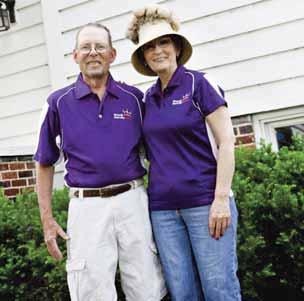
Lisa says her family keeps coming back to serve because they believe these children deserve to be loved and know the love of Jesus. The experience has given her a tender heart and has inspired her to volunteer to help hurting kids in other ways.
As the Kroekers serve together, they are transformed together. Sandy says that RFKC memories provide both laughter and tears during family gatherings. “God has made our family so close and we have so much gratitude for what he has done for us, for what he’s done in us and what he’s been able to do through us,” she says.
To see how RFKC has transformed the life of one child, visit http://royalfamilykids.org/camps/. — Myra Holmes
Read a longer version online at usmb.org
Don and Sandy Kroeker helped to bring Royal Family KIDS Camp to Henderson, Neb. The international camp network serves children with a history of neglect or abuse.
A rustic road to missions
Washington congregation supports family’s call to mission field
For two and a half years Jason and Tifany Clark and their children have been camping. It’s not an extended vacation for the family of six. Nor is it a back-to-nature adventure of living off the grid.
The Clark family, from Birch Bay Bible Church in northwest Washington state, is living in three recreational vehicles in a woodsy rural housing development because that is what it took to follow God’s call to missions. Their Birch Bay church family has stayed with them through their faith-testing path of forsaking earthly wealth and pursuing a life of mission.
The journey began in February 2011 when Jason lost his job as a heavy equipment operator. They knew their church family would support them in prayer through this crisis, but the prayer the Clarks requested was a little out of the ordinary.
“When you lose a job you think you have to get another job so you can continue to bring money in,” says Jason. “You don’t think about: what if we changed the way we live so we don’t need money, or not near as much?”
Instead of asking for prayer for a new job, the Clarks felt compelled to ask the church to pray for direction for their lives. The answer came within a month as Jason and Tifany experienced a clear call to international missions one Sunday in the worship service.
God’s guidance that Sunday morning is just one of many specific answers in a prayer partnership between the Clarks and their congregation. Over the next three years the congregation continued to pray with them— sometimes in small discernment groups and other times as they shared requests and answers to prayer during Sunday morning worship.
“Many times they’ve stood in front of the church and said, ‘We have a meeting this week. Pray for us,’ and then they would come back and report to us,” recalls church member Joanne Eytzen. Eytzen added the Clark family and their prayer updates to the missions bulletin board she posts in the church foyer.
The Clarks’ call to missions was just a first step in a long journey of prepara-
tion with their church family walking alongside. When they sold their home property (along with their goats and chickens) someone from the church offered them a 30foot motor home. Parked on property that belonged to Jason’s parents, the motor home and two travel trailers gave the family a place to live at a minimal cost.
The church encouraged them to work with MB Mission, the North American MB mission agency, in the search for a place of ministry. The mission required a period of training before pursuing an assignment. By fall both Jason and Tifany were enrolled full time at Columbia Bible College in Abbotsford, BC, with funding coming from a combination of their own resources, church matching scholarships and help from other supporters.
With mom and dad in college, new arrangements would have to be made for the Clark children who had been homeschooling with Tifany. “God just put it on our hearts,” says Birch Bay Church member Barbara Wass, who, along with her husband Skeeter, offered to homeschool the children two days per week while the Clarks drove to Canada for classes.
The Wasses had supported the Clarks in their interest in missions and had themselves just retired from 10 years of educational missions in Guinea Bissau, Africa. “We have always worked with kids,” Wass says, “and we just jumped into it.”
She was impressed with the family’s ability to adapt to the many changes required. “When they had to move out of their home into the recreational vehicles I don’t think it stressed them out at all,” she says. “It has blown me away how they can raise four kids in this situation while taking classes and being very involved in church.”
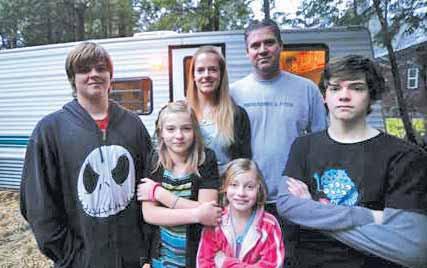
The Clark family left to right: Cayleb (age 15), Charity Ann (11), Tifany, Jason, Sarah Rose (8), and Noah (13)
Phil Davis
The Clarks’ involvement in church actually increased during their years of preparation because part of MB Mission’s training requirement is hands-on involvement in church leadership.
“We brought Jason in as an assistant moderator of the church,” Pastor Tim Thiessen says. “He learned about leading meetings and communicating in front of large groups of people. Being able to lead a team on the mission field is important, and we wanted to give him as much experience as we could.”
Thiessen was delighted to be involved in training for leadership: “This is doing what God has called us to do— develop disciples.”
Jason also became commander of Birch Bay Church’s AWANA ministry for children, working together with Tifany. Tifany continued playing flute and pennywhistle on the worship team, but also gave leadership to the church’s outreach-oriented vacation Bible school program. Both programs grew under their leadership and reached new unchurched families. “Our mission field and community impact expanded with them here,” says Thiessen.
With their time of training nearly complete, the Clarks faced another crisis and called on their church family for prayer and discernment. During their studies they had felt a strong call to serve in Thailand or another country in that region. Their school research projects often focused on topics related to the cultures and religions of Southeast Asia.
However, after their final four-month training with MB Mission, the mission offered them a placement in Guadalajara, Mexico. It was a devastating blow and the start of several months of soul-searching.
“We had very clearly expressed and our church had clearly expressed (our call to) Thailand,” Tifany says. “How is it that everything has pointed us toward Thailand and that’s not what the mission heard (from God)?”
The congregation was as surprised and perplexed as the Clarks were but once again rallied around them, praying for God’s confirmation and peace about where to go from here. “When there was doubt we just acted like a family should— listened and prayed,” says Thiessen.
Their church family’s prayer and support were vital to the Clarks processing this change in direction. “The pastors and elders were right there with us, praying intently that we would all see and hear the word that God was telling us,” Jason says.
In time, the Clarks agreed to travel to Mexico for an MB Mission “vision trip” and while there sensed a confirmation that this was indeed God’s call for them for the three-year assignment they had been preparing for.
Tifany credits the prayers and support of the church with bringing them to this point. “If we hadn’t had the community I don’t know if we would have come to the same decision. We felt that safety net around us and felt safe to stay in the place of the unknown.”
As they begin their assignment in Mexico later this year, the Clarks can look forward to the continuing support of their congregation in both prayer and practical ways. Eytzen will keep their current picture and latest news and prayer requests on the missions board.
She will also add each of their names to the 10 missionaries on her birthday calendar. On the birthday of every adult and child in the seven missionary households the church supports, Eytzen circulates a card for the church family to sign.
She encourages people to add a brief note and, if they like, a little bonus. Eytzen invites signers to put a dollar in the envelope, a gift of love from a congregation who finds practical ways to let their missionaries know that they continue to be valued members of the Birch Bay Bible Church family. — Kathy Heinrichs Wiest
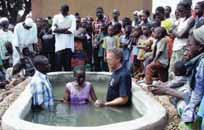
Discipleship is putting our money where our mouth is
Personalizing educational tools best way to teach stewardship
“Discipleship has to impact the way we use our resources or else we’re really not putting our money where our mouth is,” says Jon Wiebe, president and CEO of MB Foundation, the stewardship ministry for U.S. Mennonite Brethren.
Wiebe points out that pretty much every area of discipleship has implications for stewardship. Loving a neighbor, for example, might mean giving to the church’s benevolent fund, buying some groceries or loaning a car. “It really comes down to what we are doing with our money, with our time, with our resources,” he says.
It follows, then, that USMB congregations should be teaching and equipping attendees in this area.
And they are. Wiebe, who travels extensively throughout the USMB constituency, observes “a fresh wind” of interest in stewardship, especially when framed in the language of generosity. It’s “a different way to talk about it,” he says—not about obligation and duty but about a generous spirit.
Wiebe believes this is more than the latest trend; he sees a substantial willingness to lean in against the consumerism of American culture and obey Scripture. “It’s not a fad,” he says. “It’s an openness, a willingness to teach the full Word of God.”
So what’s the best way for churches to encourage and teach a biblical approach to money?
Financial Peace one popular option
One common approach is to use pre-packaged curriculum. Among the many courses available, one that seems especially popular with USMB congregations, if church bulletins and newsletters are any indicator, is Financial Peace University, a nine-week DVD-based course offered by Dave Ramsey. (See www.daveramsey.com/fpu.)
The course is divided into 90-minute sessions, each including DVD teaching followed by discussion and hands-on activities. Through the course, Ramsey encourages “baby steps” toward sound financial management, such as setting up an emergency fund or

cutting credit cards, all aimed at eliminating debt and building financial freedom. Participants purchase a membership kit with class materials, resources and workbooks for a suggested price of $109.
Ease of use
A clear advantage of using any curriculum is a certain ease of use, and USMB congregations that have chosen Financial Peace University say this resource is especially user-friendly, both for the hosting church and for those taking the class.
Churches say the logistics of hosting the course are straightforward and simple. Hosting just requires a meeting room, tables and chairs, podium or music stand, a DVD player or projector and a leader. Some congregations find that offering the course on Sunday afternoons fits well in their church life.
At Laurelglen Bible Church, Bakersfield, Calif., church leaders chose Financial Peace over other options because they found it to be engaging and because the small, practical steps are attractive. “The DVD series is a big plus for the motivation,” says church administrator Fred Ramirez.
MBF’s Wiebe agrees that Ramsey’s easyto-relate-to style is a strength of the program. He notes that even the best financial coursework misses the mark if it doesn’t “grab the heart for life change.”
Jim Gift, of Neighborhood Church, Visalia, Calif., where the course has been offered continuously since April 2009, says, “Financial Peace University is simple, the steps are easy to follow and practical, it is based upon Scripture, has tremendous online support, is common sense—and it works.”
Transforming lives
Fans of Financial Peace University point to changed lives as a clear plus for the program. Facilitators share anecdotes of participants who cut up credit cards, handle a crisis like a car breakdown without panic, talk about money with their spouse with fewer arguments or give more than they were able to before.
Bob and Tiffany Dick of First MB Church, Wichita, Kan., were married nine years when they took Financial Peace for the first time. By applying what they learned in the course, they paid off student loans, became debt-free except for their home and built an emergency fund—all of which prepared them to weather an unexpected sea-
son of unemployment and relocation to Wichita. They now facilitate Financial Peace courses at First MB, and Tiffany has begun a second career in financial planning.
“We’ve seen how a simple class on money can really transform lives,” Tiffany says. “It’s changed ours, and it has been such a blessing to be able to help others, too.”
Cautions
But one size doesn’t always fit all.
Wiebe has some concerns about Financial Peace, especially as he thinks of outfitting USMB congregations. For one thing, he says, one key motivator in Financial Peace seems to be wealth and riches. “I’ve never seen him (Ramsey) back off from that,” Wiebe says.
A scan of the titles and subtitles of some of Ramsey’s popular books reveals phrases like: 91 Days to Beat Debt and Build Wealth, A Step-by-Step Guide to Creating Abundance, or Cool Tools For Training Tomorrow’s Millionaires.
Some in the larger evangelical community have criticized Ramsey’s personal riches—his net worth is estimated at $55 million—and his assumptions about wealth. In November 2013, Ramsey’s comments on a blog post titled, “20 Things the Rich Do Every Day,” and author Rachel Held Evans’s response in a CNN blog, “What Dave Ramsey Gets Wrong About Poverty,” sparked an online debate about whether biblical financial management results in wealth.
Wiebe says that, while biblical principles will result in financial health— which may mean having more—wealth is never a biblical motivation. “(Financial stewardship) is about a life of worship,” he says. Because money
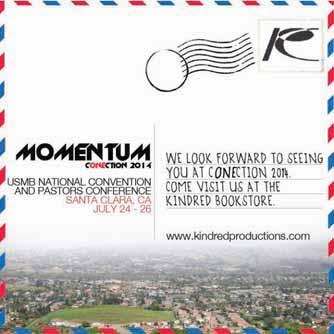
management is first an issue of the heart, following even the best principles for the wrong reasons may not honor God.
Tithing is a start
Secondly, Wiebe takes issue with the way Ramsey talks about tithing, which Ramsey seems to cap at 10 percent. While Ramsey does talk often about giving, Wiebe senses that he views a tithe as an obligation—as if once a family has given that 10 percent, they are free to do what they want with the rest.
“A tithe is a great place to start but a terrible place to stop,” Wiebe says. He prefers to teach a proportional giving model that encourages an ever-increasing capacity to give.
“It’s all God’s,” Wiebe says. “A generous spirit won’t ask how little can I give and get away with it, but rather be growing in every area.”
While First MB’s Tiffany Dick doesn’t agree that Ramsey limits giving to 10 percent, she points out that few Christians actually tithe 10 percent, so on one hand, “We’d be doing quite well to see most just achieving this ‘cap.’”
Gift, of Neighborhood in Visalia, agrees with Dick. Since only the smallest percentage of Christians tithe and the vast majority do not live according to a budget, learning basic budgeting and tithing will make a huge impact. “What would happen if God’s people got out of debt and started giving?” Gift asks.
Wiebe also questions Ramsey’s urging to negotiate for every purchase—which, if taken to the extreme, could damage Christian witness—and an assumption in Ramsey’s Legacy Journey material that all estate resources should be left to children.
Pastor Mike Petts discovered another ill-fitting area when his church, Salem MB Church, rural Bridgewater, SD, offered Financial Peace classes last fall. Petts says that farmers—a huge part of Salem’s congregation and community—had trouble relating to the principles, especially the emphasis on no debt. “Farmers have to constantly get in and out of debt to buy machinery or land,” he says.
A more customized approach
Because of these gaps in Financial Peace, Wiebe does not recommend Ramsey’s curriculum as the foundation of a church’s stewardship education. “I would recommend other material first,” he says.
Wiebe suggests Crown Financial, an in-depth curriculum that emphasizes discipleship; Good Sense, which he says is both theologically sound
and appealing; or material from Randy Alcorn’s Eternal Perspectives Ministries, which grounds financial advice with deep theology. In addition, he recommends material from authors Andy Stanley, Chip Ingram and Matt Bell. The MBF website contains links to many of these resources.
But before a congregation invests in any prepackaged material, Wiebe recommends that church leaders consider the needs of their congregation when deciding the best way to teach stewardship and generosity.
Such an evaluation begins with an honest look at the church leadership and the church budget. Are the leaders personally modeling generosity? Does the church operate under debt? Does the church give a “firstfruits” offering to missions, the community and the denominational family?
If the church leaders and the church budget don’t model good financial management, any coursework offered will be empty, Wiebe points out. “Leaders need to lead well.”
Beyond that, a church should look at motivation, expectations and what has already been done, then consider practical concerns, such as the size of the church and the church calendar. It may not be reasonable, for example, for a small congregation with an already-full calendar to add a nine-week course.
Thinking through these issues will often result in a more customized approach to stewardship education.
Resources from MBF
And MBF is happy to help congregations as they work it out. After all, Wiebe points out, one of MBF’s goals is championing biblical stewardship—resourcing local congregations so that church leaders can take it from there.
The MBF website (www.mbfoundation.com) provides links to a number of resources, like their monthly devotional, past teaching campaigns including Advent Conspiracy and The Genius of Generosity and recommended material from established experts.
For even more customized help, Wiebe and MBF staff members are available for consultations with church leaders and for preaching and teaching on stewardship. Wiebe would gladly field queries from church leaders about how to equip their congregation in the area of stewardship—to help them put their money where their mouth is.
“If we really care about people’s discipleship, we have to talk about (money),” he says.
To contact MBF, call 800-551-1547 or email Wiebe at jwiebe@mbfoundation.com.
Myra Holmes









Don Morris Mission USA director
It’s time to become passionate
Over the coming months, I’ll be saying quite often that it’s time. For us as Mennonite Brethren, it’s time to become exceedingly passionate about reaching people who don’t yet know Jesus with his message of renewal and redemption. To me that means it’s time for us to plant more churches, as many as six per year. But we’ll need planters, partnerships, locations and money to get it done. In addition, it’s time for our existing churches to develop a deeper passion and real success for reaching the lost and discipling them. Some of our churches are already doing this, and they can be the flag bearers for this movement as God seeks to change lives.
I firmly believe our Savior is leading us to do much more to help build his church. And I want to be abundantly clear that we are at this moment in the life of the Mennonite Brethren Church in America because of leaders who have given their creativity and passion to bring us to this point. I’d like to focus on one leader in particular: Ed Boschman. When you read this, Ed will be close to retirement after sevenplus years as the USMB executive director. Ed previously served us as the first director of Mission USA.
I have had the privilege of serving directly under Ed’s exemplary leadership. He cares from deep

Three quarters of Americans say they watch some TV EVERY DAY— but the amount of time they spend watching varies greatly.

within his soul about people’s eternal destination and craves seeing people come to faith. He cares strongly about the health of our churches, districts and the national conference. He has served us very well. He has consistently responded to criticism with grace.
I have heard countless people express great appreciation for all the hard work Ed gave for us year after year. Many people say we are in a better place now as a conference of churches due to this man’s leadership. I believe most of us, except perhaps his wife, Carol, don’t have an inkling just how much Ed lived and breathed this work on our behalf. So, Ed, thank you! I can write about the fact that it’s time because you have led us so well to this juncture.
Over the coming months, USMB, districts and many MB agencies will be involved in a structural review. With a consultant’s assistance, we’ll be intently looking into the ways in which we all work together, finding pathways where we can do that more effectively. I think God has placed this before us at this time because he wants to bind us together in a healthier way so that we are poised to experience a movement of his power and zeal among us. It’s time.
A lot of denominations seem to be headed in the wrong direction—losing members and even losing their way theologically. But, for us, it’s time to witness a new, powerful movement of God!
Practicing Christians tend to watch more television than non-Christians, an average of 3.2 hours per day compared to 2.6 hours for non-Christians
Boschman to serve in LEAD Coaching program
Ed Boschman, USMB executive director, will serve as head coach of USMB’s LEAD Coaching program, beginning August 1. Boschman, who will retire as executive director at the end of July, will provide overall leadership for this national coaching initiative on a part-time basis and will oversee the continuing development of LEAD Coaching coaches.
LEAD Coaching is part of Mission USA, the USMB church planting and church health ministry. LEAD Coaching provides life-on-life coaching for pastors, ministry leaders and church lay leaders for an agreed-upon term—at basically half the monthly rate of typical Christian life coaching.
“Because of my experience with both having been coached and currently having a coach, I know without a doubt that I can commend this experience to our church staffers and lay leaders,” says Boschman. “It helps you grow as a person and will ramp up your impact in ministry.”
Boschman says life coaching can help pastors and leaders move forward in their ministry and their personal lives. “If you are not content with how things are in your life and you would like to move beyond having to survive your less-than-satisfactory reality, skilled life coaching through LEAD Coaching will provide the help you need to get unstuck and become the best you can be,” says Boschman.
“You can achieve stable spiritual health and general well-being and balance in your life,” says Boschman. “Powerful questions provided by the coach will inspire you to develop a satisfying life plan, ministry vision and ministry plan. As a bonus, you will discover ways to maintain your priority commitments and get things done.”
Boschman believes that connecting with another person about ministry challenges offers great benefits.
“I know that the Spirit of Jesus is the ultimate ‘coach’ for my life, but because of my hard-core humanness, the fact that he is not in the flesh and does not audibly talk to me creates a challenge,” says Boschman. “Having a real live person who cares deeply about me and regularly connects with me about
how I am really doing, is both high privilege and greatly motivating. It may well be that the accountability factor is the greatest benefit.”
LEAD Coaching provides an opportunity to review and refocus life using a one-year “Core Four” model, says Boschman. The phases are: Life Plan, Ministry Vision, Ministry Plan and Priority Management.
“One key reality in the process is that the person being coached holds the reins to the action plans,” says Boschman.
As the LEAD Coaching supervisor, Boschman will ensure quality and consistency in coaching, provide training venues, establish coaching guidelines and handle individual coach concerns. As head coach he will also champion LEAD Coaching among our USMB constituency.
“It will be a privilege to link with the trained/certified coaches we have in our USMB family,” says Boschman. “My goal will be to keep them encouraged and well resourced as they partner with their coachees. I am honored to have been invited to serve in this way.”
To learn more about LEAD Coaching, visit www.usmb.org.
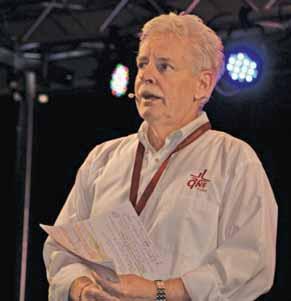
Crystal Nachtigall

The dilemma of Mary and Martha
In the story of Martha and Mary in Luke 10:38-42, Martha hosts a dinner for Jesus. She’s “distracted with much serving,” saying to Jesus, “Lord, don’t you care that my sister has left me to do the work by myself? Tell her to help me!” But the Lord answered her, “‘Martha, Martha, you are anxious and troubled about many things, but one thing is necessary. Mary has chosen the good portion, which will not be taken away from her’” (ESV).
This story has haunted me for years. We all want to be Mary, sitting at Jesus’ feet, soaking in the grace and peace of his presence. We want to be Mary in our homes and families too; we’d love to snuggle on the couch with our kids all day, reading books, making bracelets and playing pretend. But the dirty diapers must be changed, the groceries must be purchased and if we never took out the trash—you get the point.
At times I’ve felt sympathy for Martha. We’ve been there—hosting a party and being stuck in the kitchen trying to get all the food ready while the guests are laughing and enjoying the appetizers out on the patio. We say to ourselves, “Somebody’s got to do this.”
So here’s the dilemma: I truly want to be a Mary, but sometimes I’m stuck being a Martha simply because Martha’s work must be done eventually. Can you relate?
Looking at the original text, I notice that Jesus doesn’t correct Martha for working. In fact, Luke says that Martha is “serving,” which we often see Jesus himself doing. Jesus isn’t saying, “Don’t work.” Rather, Jesus corrects Martha’s attitude while praising Mary’s. It’s as if he’s inviting us to drop the bitter,
workaholic act and sit down—proverbially or literally—as the eager, relaxed listener.
This passage offers priceless insight to me as a parent. Yes, there is work to be done, diapers to change and food to prepare. But instead of being “anxious and troubled,” Jesus invites me as a parent to take on Mary’s attitude. Instead of cultivating that stressed, harried, hectic attitude with my kids, perhaps the Lord wants me to model an attitude of relaxed joy and willing service as I go about my work.
Instead of gawking over the increasing mountain of dishes in the sink, I can thank the Lord for the delicious meal we shared as a family with the food we could afford to buy. Rather than begrudgingly taking out the stinky diaper trash, I can celebrate the fact that my kids have perfectly working digestive systems that are fearfully and wonderfully made. And those dirty spots on the walls can wait. As a friend says, “I’m not raising a house. I’m raising kids.”
If Jesus came to my house for dinner, I’m sure there would be toys on the floor. But I bet he’d plop right down between the blocks and the rocking horse, hold little Sam on his lap and tell my girls a story. Would I stress over dinner? I have a few Tilapia fillets and bread loaves in my freezer. Maybe if I tell Jesus about my fish and loaves he’ll do the cooking.
In the meantime, I think I’ll make myself a sign to hang in my entryway that reads, “If you think my hands are full, you should see my heart!”
This essay by Crystal Nachtigall, Fresno, Calif., first appeared on the Bethany MB Church blog, “proverbs2v6” (http://proverbs2v6.wordress.com) and is reprinted with her permission.



Matt Ehresman
Beauty, trust and PowerPoints
Does it matter what fonts you use in your church PowerPoint slides? Why do I spend days—and nights—working on a sanctuary stage design? Why spend hours editing video when many people would be fine with the raw footage?
I do these things because beauty and quality are important. I believe beauty makes us feel comfortable, and quality helps us trust. When people come to our churches we want them to feel comfortable enough to be authentic and trust us enough to listen to our teaching.
Beauty makes us comfortable
How do you describe how it feels to watch a great film, listen to your favorite album or see a beautiful piece of art? Even on frustrating and busy days, these things bring at least a little bit of joy, don’t they? Something about beauty helps us breathe deeper and relax our shoulders.
There’s a reason why we decorate our homes and offices. Especially as our lives get more hectic, we desire serenity. It’s much easier to focus and relax in a space that feels harmonious.
This is one reason why we put effort into making our churches visually appealing. If our church postcards exclusively use Comic Sans (don’t even get me started), hallways are oversaturated with mismatched posters and our stage is covered in messy cords and cables, this level of chaos is just one more obstacle we’re asking guests to overcome before hearing our message. Beauty and organization can be the first step to helping our guests really listen—and not just hear—the good news.
Quality helps us trust
When making big decisions in life, what kinds
of things do you look for when comparing people or businesses to trust?
Let’s say you’re looking at two different websites trying to decide where to send your kids to preschool. One site has a really nice design with colors that blend well, lots of bright photos of smiling kids and a page where you can read about the teachers. Overall, everything appears put-together. The other site is full of orange and green backgrounds with red text and at least five different fonts. The photos are obviously pulled at random from Google Images, several words are misspelled and you can’t even find the address or phone number for the school.
Which preschool are you more likely to trust?
Probably the first one, even though someone’s ability to design a website has no correlation to the ability to teach children the alphabet.
Why is that? We tend to trust people and organizations that take time to notice the little things. If a church is diligent enough to care about fonts, spellings and colors, it isn’t as hard to believe that it is also going to provide good care for your children in the nursery and that people there will take the time to ask how your job is really going.
I know your days are busy, but next time you’re designing a flyer for a church event or sprucing up your church lobby, remember that people notice beauty and appreciate good quality. We should stand out amongst the clutter in the world and be known as people that provide a peaceful and comforting place to experience the Savior.
Matt Ehresman and his wife, Tillie, live in Wichita, Kan., where he works as the creative media director at First MB Church.
re: Worship

“We call ourselves people of the Book,” says Christine Longhurst, “but in reality so many of our churches use so little Scripture in worship.” In an effort to help congregations refocus their worship on the Bible, Longhurst, a Mennonite Brethren living in Winnipeg, Man., who has been studying, teaching and working in worship for more than 25 years, created www.re-worship.blogspot.com. This online resource for worship leaders and planners has racked up more than 4.75 million views since its birth in April 2011. First-time visitors may want to visit the “How to use this blog…” link for help getting started.

BAPTISM/MEMBERSHIP
Sixteen people were received May 4 as members of North Oak Community Church, Hays, Kan.: Craig and Cari Smith, Mark Thowe, James and Jann Mages, Sharon Graham, Karen and Kenny Rigler, Annie Zachman, Sharon and John Ross, Bryan Noone, Blake and Amanda Matzke, Kim Lanning and Helen Ediger. Amanda Matzke was also baptized.
Brandon Mathis, Gunner Morgan, Jaruwat Maendl, Kenny Clayton, Lindsey Hutchison and Maria Cooper were baptized May 18 at South Mountain Community Church, Draper, Utah Shane Helm was baptized May 18 at the Daybreak campus, and Cassidy Brady was baptized May 16 at The Springs campus.
Joshua Barnett, Talan Hickman, Aiden O’Neill, Quentin Lueck, Zaylie Pasillas, Jesus Miramontes and Zachary Weeks were baptized May 11 at Laurelglen Bible Church, Bakersfield, Calif
Allison Camden, Eric Franklin, Simran Grover, Wendell Noteboom, Ron Stocks and Karina Thiesen were baptized April 20 at North Fresno (Calif.) MB Church and received as members April 27. Betty Jacks, Milt and Brenda Friesen, Stephanie Hawes, Ryan McCauley and Judy Noteboom were also received as members.
Sharon Pfister was received as a member of College Community Church MB, Clovis, Calif., June 1.
Jeff Noorigian, Lindsey Noorigian, Katherine Herrera, Diane Leporati, Isaiah Vargas, Jesse Vargas, Mario Coronado and Elisa Palacios were baptized April 20 at Reedley (Calif.) MB Church
Kala Benson and Grace Voth were baptized and received as members of Enid (Okla.) MB Church April 13.
Bobby Mallory, Bailey Bryant, Rylee Wahl, Jel Leslie, Brandi Sharp and Amanda Robinson were baptized and received as members of Fairview (Okla.) MB Church April 20. Kim & David Pierce, Jeff and Alice Starkey, Josh Doyal, Kari Robison, Stephanie Martens and Tammy Mallory were also received as members.
WORKERS
Brandon Vogt has resigned as associate pastor at Ebenfeld MB Church, Hillsboro, Kan. Ryan Loewen will begin serving Aug. 4 as the interim.
Jeff Neher, youth pastor at North Oak Community Church, Hays, Kan., is on sabbatical until Aug. 11. Spencer Greathouse is serving while Neher is gone.
Keyln Vix is serving as a junior high youth intern this summer at Hillsboro (Kan.) MB Church
Chad Stoner, pastor of Stony Brook Church, Omaha, Neb., is on sabbatical in June and July.
Bill Braun, pastor of College Community Church
MB, Clovis, Calif., has retired. The church held a retirement party for him June 7 and the following day was his last Sunday.
Jim Aiken, pastor of Dinuba (Calif.) MB Church, began a three-month sabbatical May 4.
David Beeghly is serving as a youth ministry intern this summer at Heritage Bible Church, Bakersfield, Calif.
Darren Rempel, pastor at Valleyview Bible Church, Cimarron, Kan., resigned effective May 25. The church held a farewell for his family that Sunday.
Fred Leonard, pastor at Mountain View Community Church, Fresno, Calif., is on sabbatical until Aug. 10. 1
James Bergen, pastor of North Fresno (Calif.) MB Church, is on sabbatical May 4-Aug. 4.
Micah Bentley is the new director of music and worship at Axiom Church, Phoenix, Ariz
DEATHS
Edins, Eleanor Eitzen, Wichita, Kan., member of Ebenfeld MB Church, Hillsboro, Kan., Dec. 17, 1930—May 1, 2014. Parents: George and Sara (Krause) Flaming. Spouses: John Eitzen, Jr., deceased; Craig “Bud” Edins, deceased. Children: Galen, Barbara Riggs, Stuart; three grandchildren; five step-grandchildren; eight step-greatgrandchildren.
Friesen, Vernon W., Hillsboro, Kan., of Hillsboro MB Church, Aug. 9, 1928—May 18, 2014. Parents: Jesse and Lydia (Wiens) Friesen. Spouse: Rachel Kornelsen. Children: Sarita Blosser, Terryl, Jody Heizelman, Donnel; 10 grandchildren.
Glanzer, Jacob E., Bridgewater, SD, of Salem MB Church, Bridgewater, Nov. 18, 1921—May 21, 2014. Parents: David S.W. and Elizabeth (Hofer) Glanzer. Spouse: Susie Maggie Mendel, deceased; Phoebe Wiebe Jost, deceased. Children: Jules, Elgin; five grandchildren; three step-children; nine great-grandchildren; six step-grandchildren; three step-great-grandchildren.
Regier, Arnold, Hillsboro, Kan., of Hillsboro MB Church, Oct. 8, 1930—April 25, 2014. Parents: Henry and Tena (Rempel) Regier. Spouse: Edith Vogt. Children: Greg, Carol Sweat, Beth Rohrig; seven grandchildren; three great-grandchildren. Thiessen, Evelyn Wiens, Corn, Okla., member of Corn MB Church, Jan. 6, 1921-May 9, 2014. Spouse: Arthur J. Thiessen, deceased. Children: Nancy Regier, Johanna Flaming, Tim, Dan, Lillian Schantz, Jim; 26 grandchildren; 33 greatgrandchildren.
reaching in DISCIPLESHIP
First MB Church, Wichita, Kan., offered “National Day of Prayer Drive-Thru” May 1, which in-

Greenhaven turns 50
Greenhaven Neighborhood Church, Sacramento, Calif., celebrated 50 years June 1. About 225 people attended a jubilee service, including Pacific District minister Gary Wall and several former pastors. “Each speaker reminded us of God’s faithfulness to his plan, his Word, his Son and his children in the 50 years of this wonderful little church,” says Pastor Paige Vorhies. The service was held outside on the church’s property—a favorite setting for worship—followed by a lunch.
The church began as an outreach of Pacific District Conference (PDC), with 31 people signing the charter, including current attendees Orval and Marlene Balzer. Originally known as Florin MB Church, then Florin Community Church, the church became Greenhaven Neighborhood Church when it moved to the current facility in the Greenhaven neighborhood in 1979.
Vorhies says the church is known for focusing on the Bible and on loving their neighbors—a strength he sees extending into the future: “(God) has a purpose for this church,” he says, “and I think that’s because we’ve been very true to his Word, and we’ve been very loving to the community. And we want to make sure that continues.”


Quilters raise top dollar
Members of Hillsboro (Kan.) MB Church made the top-selling quilt at the Kansas Mennonite Relief Sale April 11-12. The hand-stitched quilt brought a record bid of $11,600 that earned a standing ovation from the auction crowd. The money raised will support the work of Mennonite Central Committee (MCC), an interMennonite agency supported by USMB congregations. MCC is the beneficiary of 27 relief sales held annually in the United States and Canada. HMBC has a long history of providing a quilt for the annual relief sale.
Agua Viva merges
Iglesia Agua Viva, a Spanishlanguage congregation that shares facilities with Kingsburg (Calif.) MB Church, has merged with another Spanishlanguage congregation, The Good Samaritan, for stronger ministry. The two congregations began meeting together in February and celebrated the merger June 22 with a service that also included Kingsburg MB Church. According to Ron Penner, pastor of Kingsburg MB, the merger has brought new energy to Agua Viva and positioned them well to minister to the Hispanic population in Kingsburg. The congregation is still called Iglesia Agua Viva; Alfred Foth and Sergio Millan will share pastoral duties.
cluded free coffee and prayer guides in the church parking lot. The congregation has been challenged to memorize 10 specific passages of Scripture in 2014. Each passage will be the focus of a Sunday morning sermon sometime during the year.
A prayer group from Henderson (Neb.) MB Church met in the city park every day from Easter through Pentecost. The group listened, prayed and read through sections of Acts, the prophets and Gospels. Four meeting times were planned for weekdays; one meeting each was scheduled for Saturdays and Sundays. Meetings lasted no more than 30 minutes.
Mountain View Community Church, Fresno, Calif., hosted “10 Days of Global Prayer” May 29-June 7 and a Global Day of Prayer Concert June 8.
Dinuba (Calif.) MB Church challenged attendees to participate in 40 days of concentrated prayer and fasting beginning May 5.
Reedley (Calif.) MB Church offered a workshop April 12 for those interested in becoming foster or adoptive parents.
Trinity Church, Portland, Ore., has launched a new ministry to college-age and young adults. The group will meet regularly for social events, Bible study and outreach.
FELLOWSHIP
A group of “Mennonites on Bikes” (MOB) from Enid (Okla.) MB Church rode motorcycles to Greensburg, Kan., May 18 to raise funds for Mennonite Central Committee.
Women from Mountain View Community Church, Fresno, Calif., are meeting weekly this summer to work out together. On Mother’s Day, magnets with family photos were offered to the congregation.
While women from SMCC@The Springs, St. George, Utah, went on a retreat June 6-8, dads and kids had a doughnut party before Sunday services June 8; kids were encouraged to wear their pajamas.
Shafter (Calif.) MB Church held their annual church picnic June 1. Activities included swimming, softball and yard games.
A cookout May 22 at Bible Fellowship Church, Minot, ND, included children and families from the Good News Club that the church helps with at the local school.
Attendees of Grace Bible Church, Gettysburg, SD, went on an all-church campout June 27-29. “Steppin’ Out and Steppin’ Up” was the theme for a women’s event April 27 at Dinuba (Calif.) MB Church
Men from South Mountain Community Church, Draper, Utah, meet for golf every Thursday evening this summer. The group meets at a dif-
ferent course each week. Players of all ability levels are welcome.
Butler MB Church, Fresno, Calif., held an outdoor worship service May 18, followed by an allchurch picnic. Activities included a water balloon toss, a silent auction to benefit missionaries in Thailand, bounce houses, swimming and “picnic Olympics,” a series of fun and easy team games.
A breakfast May 11 honored mothers at New Life Fellowship, Grant, Neb.
Activities May 4 at Mountain View Sunnyside, Fresno, Calif., celebrated “May the fourth be with you” and had a Star Wars theme. Worship was followed by lunch and a softball game.
May was family month at Kingsburg (Calif.) MB Church. Activities included a family picnic, recognition of mothers and graduates, a report from their extended church family (i.e. missionaries) and a family camp May 30-June 1.
Laurelglen Bible Church, Bakersfield, Calif., organized a picnic in a local park May 4.
Attendees of Bible Fellowship Church, Rapid City, SD, played ultimate Frisbee and had a potluck in a park May 4.
High school and college graduates of College Community Church MB, Clovis, Calif., were honored with a brunch May 18.
May 17 was “Gifts and Talents Night” at North Park Community Church, Eugene, Ore. The evening began with a potluck and displays of handmade talents and crafts, followed by performance talents.
Men from Parkview MB Church, Hillsboro, Kan., held a retreat April 25-26.
Attendees of North Fresno (Calif.) MB Church will travel to San Francisco, Calif., by doubledecker bus July 26 for “A Day by the Bay,” including a baseball game.
WORSHIP
Boone (NC) MB Church held nightly revival services June 1-4.
Children at North Fresno (Calif.) MB Church were invited to participate in “The Easter Path,” an interactive experience of Jesus’ last days, during worship services on Easter Sunday.
Laurelglen Bible Church, Bakersfield, Calif., held combined worship services this summer.
reaching out
LOCALLY
Shafter (Calif.) MB Church will hold a wrestling camp July 14-18 at the church. A final event Friday evening, July 18, includes an exhibition match and dessert.
Bethesda MB Church, Huron, SD, will hold their annual Super Summer Jam for children in four
locations throughout the city July 28-Aug. 2. Activities will include games, crafts, food, special events and presentation of the gospel.
This summer, attendees of South Mountain Community Church, Draper, Utah, filled backpacks with supplies to benefit needy children through a local nonprofit.
GLOBALLY
Volunteers from Henderson (Neb.) MB Church baked cookies April 30 to be sent to The GreenHouse, a church plant in Utah, for use during regular Thursday night dinners.
LOCAL CHURCH JOB OPENINGS
Associate Pastor: Madera Ave. Bible Church in Madera, Calif., has an immediate opening for a fulltime associate pastor, a new position for the church. The ideal candidate would have a church-planting mind-set, exhibit strong leadership skills and have previous ministry experience. The position would include but not be limited to community outreach with an emphasis on young families, working with junior high and high school youth and coming alongside the senior pastor as needed. Salary will be commensurate with experience. Established in 1919, MABC has a current average of 70 in attendance for Sunday worship. All interested parties are encouraged to mail or e-mail a letter and resume to: Madera Ave. Bible Church, 124 Walnut, Madera, CA 93637 pastor@maderabiblechurch.org
Pastor of Care Ministries: Shafter (Calif.) MB Church is seeking a part-time pastor of care ministries. For additional information, please contact Patrick Coyle at pcoyle@shaftermb.org or call the church office at 661-746-4969.
Senior Pastor: Kingsburg MB Church is seeking a full-time senior pastor for a congregation of approximately 150. Inquiries or resumes should be sent to Kingsburg MB Church, 1301 Stroud Ave, Kingsburg, CA 93631 or emailed to kmbcsearch@gmail.com
Lead Pastor: Ebenfeld MB Church in rural Hillsboro, Kan., is seeking a full-time lead pastor for our congregation of approximately 300. Inquiries or resumes should be sent to Ebenfeld MB Church, 107 N. Main, Hillsboro, KS 67063 or emailed to ebenfeldpastorsearch@gmail.com
AGENCY JOB OPENINGS
Planned Giving Advisor: MB Foundation is accepting applications for planned giving advisor. This person, based out of the Fresno, Calif., office, will represent MBF programs and services to individuals and ministries throughout the West Coast. MBF is a service agency of the U.S. Conference of MB Churches. Salary commensurate with training and experience. If interested, send a letter and resume to: Jon C. Wiebe, President/CEO, MB Foundation, PO Box 220, Hillsboro KS 67063 (jwiebe@mbfoundation.com)
UNIVERSITY JOB OPENINGS
Fresno Pacific University is seeking qualified candidates for positions in the School of Business: Program Director of the Undergraduate Business Management Program; Program Director of Masters in Business Administration Program and Regional Center Director of Business Programs – Visalia. All job descriptions and applications may be viewed on-
Youth from Heritage Bible Church, Bakersfield, Calif., served in Ivanhoe, Calif., in April by running a vacation Bible school.
Shafter (Calif.) MB Church sent a team of 15 high school students and six sponsors to serve in inner city Los Angeles April 25-27.
North Fresno (Calif.) MB Church is sending a shortterm team to Portugal July 15-29.
Heritage Bible Church, Bakersfield, Calif., sent a team to Haiti June 25-July 2.
A team from Bethesda MB Church, Huron, SD, served in inner-city Chicago June 22-30.
CLEARINGHOUSE
line at the Fresno Pacific University website: www.fresno.edu/careers
EVENT
MEDA Convention 2014: “Human Dignity through Entrepreneurship.” Join MEDA for 4 days of inspiration, information and networking in Winnipeg Nov. 6-9. Plenary sessions feature topics on creating human dignity through business; combining MEDA financing and training to enhance small business development globally; a captivating story of imprisonment in North Korea, and congregational vision for dignity. The Friday evening session will be held at the new Canadian Museum for Human Rights. Go to www.medaconvention.org for full descriptions of the plenary sessions, seminars, tours and online registration, or call 1 (800) 665-7026 for more information.


Dinuba (Calif.) MB Church sent a team to Portugal June 11-21 to work alongside MB Mission workers Otto and Marjorie Ekk.
A team of 24 youth and adults from Pine Acres Church, Weatherford, Okla., went to Boston, Mass., over spring break to serve.
NEW BOOK
For Sale: A Culture of Call: The Story of the Carson Mennonite Brethren Church. In this book, author Elaine Ewert Kroeker records the 130-year saga of the people of the Carson MB Church in Delft, Minn., and their desire to both serve and to send in the name of Jesus. Available from the Tabor College JayShop online at jayshop.tabor.edu
WEBSITE SERVICES
Revelation Graphic Arts in Hillsboro, Kan., provides creative and economical media elements for churches and ministries of all sizes. Complete websites start at $599, plus mobile apps, logos, sermon/event artwork and print materials. More info: Call David Vogel at 620-877-7540 or visit revelationgraphicarts.com. (2014)










